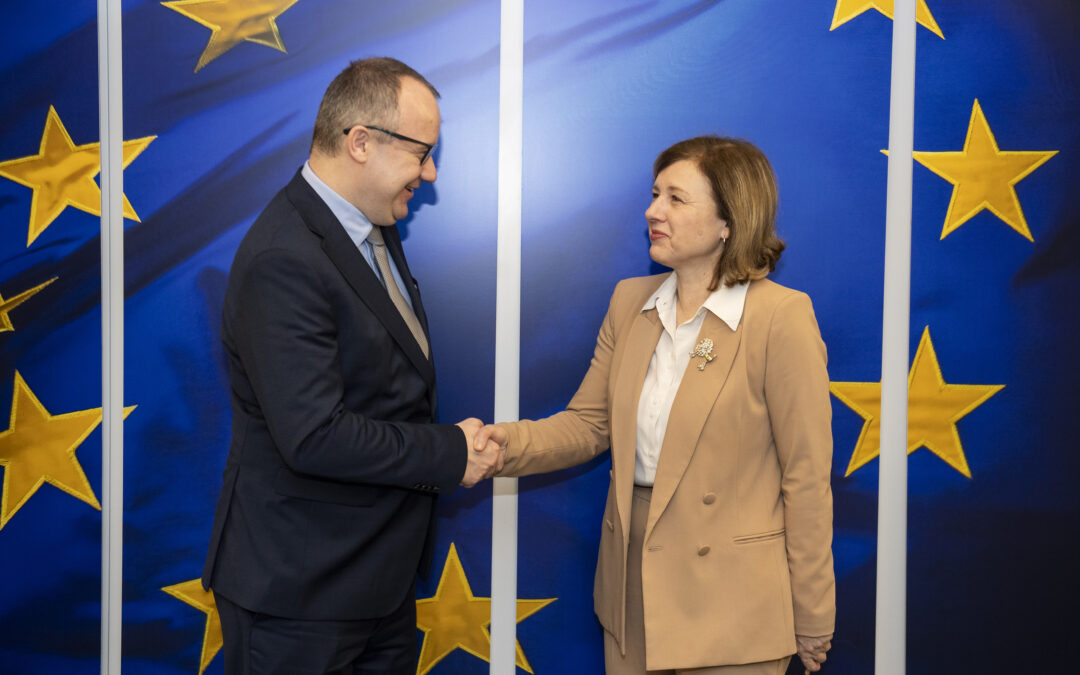Poland’s justice minister has today presented in Brussels the new government’s action plan to restore the rule of law by reversing violations of the previous Law and Justice (PiS) administration.
European Commission Vice President Věra Jourová called the move “an important first step” and pledged that the EU will now assist Poland in implementing the plan aimed at closing the rule-of-law procedure – known as Article 7 – triggered against the country in December 2017
“I have a dream that still during my mandate the application of Article 7…on Poland will be removed,” wrote Jourová wrote on X.
At the same time, she emphasised that today’s meeting does not determine the final decision of the European Commission. The EU’s justice commissioner, Didier Reynders, also told the Polish Press Agency (PAP) that the reaction of all member states will be important.
I have a dream that still during my mandate the application of the Article 7 #TEU on Poland will be removed.
Today, 🇵🇱 government made an important 1st step with the Action Plan.
We will assist now in implementing the plan to address remaining #RuleofLaw concerns. pic.twitter.com/p6yaJfFBef
— Věra Jourová (@VeraJourova) February 20, 2024
The European Commission triggered Article 7 proceedings against Poland in December 2017 in response to concerns that the policies of the PiS government, in particular its overhaul of the judiciary, represented “a clear risk of a serious breach” of the rule of law, human rights, and press freedom in Poland.
Article 7 can, in theory, result in a member state’s EU membership rights being suspended. However, any such action requires a unanimous decision among all other member states, something that was impossible for Brussels to achieve, with Hungary – also subject to Article 7 proceedings – pledging to support Poland and vice versa.
PiS always argued that its judicial policies were legal and justified, to improve the functioning of courts and remove the influence of a “post-communist elite” that allegedly controlled them. It claimed that the EU only took issue with its approach for political reasons, because it did not want Poland to be ruled by a conservative government.
The new ruling coalition that replaced PiS in government in December has pledged to restore the rule of law in Poland. Prime Minister Donald Tusk, even before taking office, visited Brussels to outline those plans.
Minister @Adbodnar bierze udział w spotkaniu z europejskim komisarzem ds. sprawiedliwości @dreynders w #GAC. Głównym tematem jest prezentacja Planu Działań dotyczącego procedury art. 7 TUE, która ma na celu zapewnienie, że wszystkie państwa członkowskie szanują wspólne wartości… https://t.co/oV5xwFI31M
— Min. Sprawiedliwości (@MS_GOV_PL) February 20, 2024
The justice minister, Adam Bodnar, today further outlined plans to introduce laws amending the status of the National Council of the Judiciary (KRS) – the body responsible for nominating judges, that was placed under greater political control by PiS – as well as the Constitutional Tribunal, the Supreme Court, and the common courts, all of which had to a greater or less extent been brought under PiS’s influence.
He also plans to separate the roles of the justice minister and the prosecutor general, which were fused together by PiS.
“This is the action plan that the Polish people are waiting for,” Bodnar told PAP. “This is the action plan…they have been calling for over these many years, fighting in the streets, protesting. Demanding the independence of the judiciary.”
During a press conference after meeting with Bodnar, Jourová stated that “for years, we have tried to find a way to address the serious concerns, and for the first time since Article 7 is in place, the Polish government presented a comprehensive plan on how to do it”.
"We are very happy that the new government is fully determined to restore the rule of law in Poland," said EU Justice Commissioner @dreynders after meeting justice minister @Adbodnar during a visit to Warsaw https://t.co/epN7kpjXzU
— Notes from Poland 🇵🇱 (@notesfrompoland) January 19, 2024

Notes from Poland is run by a small editorial team and published by an independent, non-profit foundation that is funded through donations from our readers. We cannot do what we do without your support.
Main image credit: European Union, 2024

Agata Pyka is a former assistant editor at Notes from Poland. She specialises in Central and Eastern European affairs, cybersecurity, and investigative reporting. She holds a master’s degree in political communication from the University of Amsterdam, and her work has appeared in Euractiv, the Balkan Investigative Reporting Network (BIRN), and The European Correspondent, among others.



















